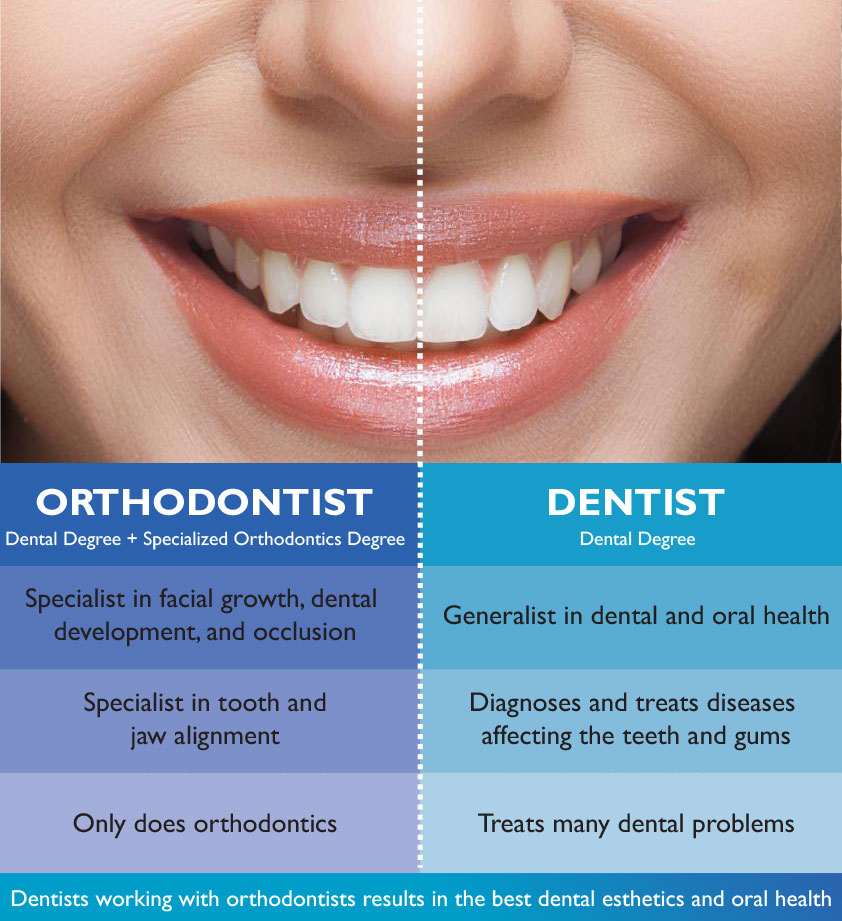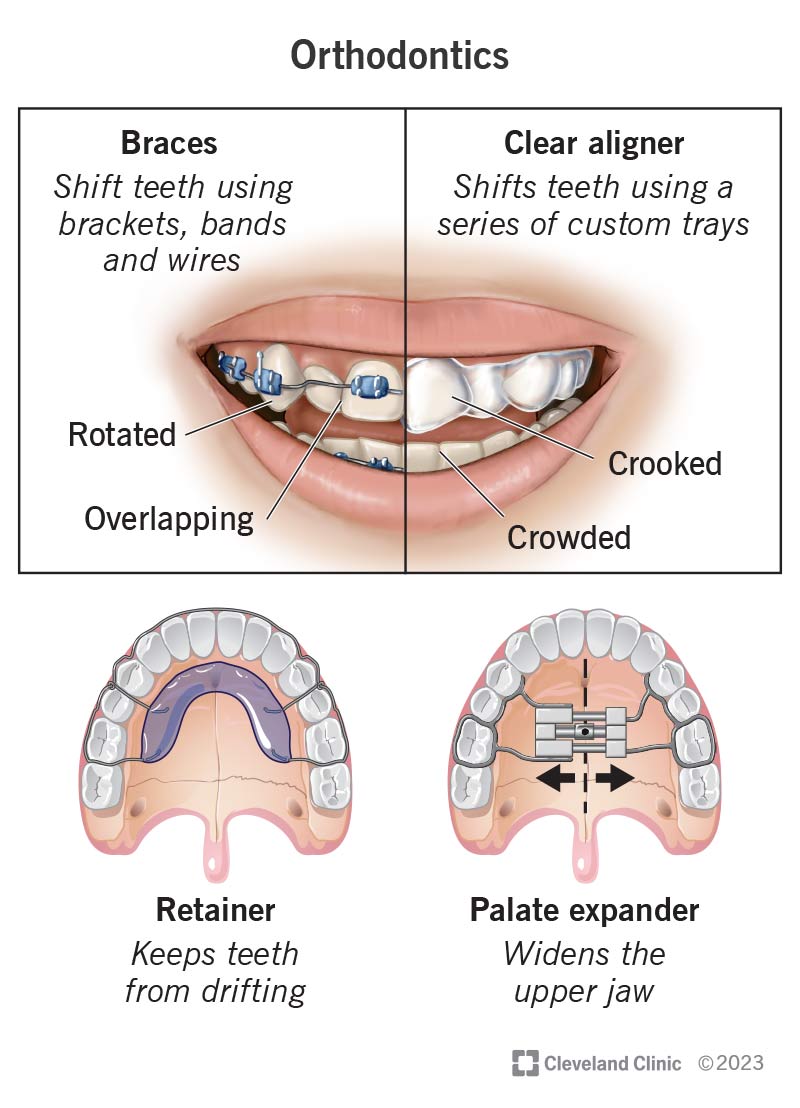A Biased View of Causey Orthodontics
A Biased View of Causey Orthodontics
Blog Article
A Biased View of Causey Orthodontics
Table of ContentsThe Greatest Guide To Causey OrthodonticsFacts About Causey Orthodontics RevealedThe Definitive Guide for Causey OrthodonticsNot known Facts About Causey OrthodonticsThe Of Causey OrthodonticsCausey Orthodontics Can Be Fun For EveryoneThe 9-Minute Rule for Causey Orthodontics
What is the difference in between a dental expert and an orthodontist? All dental experts, including orthodontists, treat the teeth, gums, jaw and nerves.
You can assume of both physicians that treat periodontal and teeth troubles. The primary distinction is that coming to be an orthodontist calls for a specific specialized in treating the misalignment of the teeth and jaw.
A Biased View of Causey Orthodontics
An orthodontist is a dentist that has undergone training to specialize in the diagnosis, avoidance and treatment of abnormalities in the jaw and teeth. They can likewise identify potential troubles in teeth alignment that may develop when problems are left without treatment (orthodontist near me).
This consists of all the necessary education to end up being a general dental professional. According to the American Pupil Dental Organization (ASDA), it indicates you will certainly need to have either a Physician of Medication in Dentistry (DMD) or a Medical Professional of Oral Surgical Treatment (DDS). To put it simply, orthodontists need to finish oral college and afterwards obtain an orthodontics specialized education and learning.
Some orthodontists likewise get their masters in craniofacial biology. affordable orthodontist near me (https://us.enrollbusiness.com/BusinessProfile/6789229/Causey%20Orthodontics). Many oral schools supply restricted orthopedic training and direction, which is why general dentists need to head to orthodontic school after college graduation. Orthodontic residency programs offer intensive training for this sort of dental expertise. These programs concentrate on two particular locations or techniques: Dentofacial Orthopedics: This research concentrates on leading teeth and jaw development.
The smart Trick of Causey Orthodontics That Nobody is Discussing

 These consist of device such as dental braces, retainers and Invisalign. So, what does an orthodontist do, and what do they focus on? The general objective of an orthodontist is to boost a patient's bite. Not everyone is birthed with straight teeth, and an orthodontist will certainly guarantee that patients get evenly spaced straight teeth.
These consist of device such as dental braces, retainers and Invisalign. So, what does an orthodontist do, and what do they focus on? The general objective of an orthodontist is to boost a patient's bite. Not everyone is birthed with straight teeth, and an orthodontist will certainly guarantee that patients get evenly spaced straight teeth.
7 Simple Techniques For Causey Orthodontics
The American Organization of Orthodontists recommends your first check up by age 7. You'll require to see your orthodontist if you have an imbalance in your teeth, additionally recognized as malocclusion. Likewise, if you discover irregular bite patterns, a somewhat irregular jaw, or when your teeth are jammed, you will likely require orthodontic therapy.
In addition, we provide adjustable therapy timetables, adaptable settlement alternatives and an enjoyable, enjoyable experience.
An orthodontist is a dentist educated to identify, prevent, and treat teeth and jaw irregularities. They correct existing problems and are trained to identify problems that might establish in the future. Orthodontists function with people of any ages, from children to adults. People commonly connect an excellent smile with health.
Getting My Causey Orthodontics To Work
Malocclusion, or misaligned teeth, can bring about oral issues, consisting of dental cavity, gum condition, and tough or excruciating chewing. However not everybody is birthed with straight teeth. If you have a poor bite or huge spaces between your teeth, you may intend to consult a dentist specializing in orthodontic care.
(Image Credit Score: DigitalVision/Getty Images) Orthodontists utilize repaired and detachable dental tools, like dental braces, retainers, and bands, to alter the position of teeth in your mouth. Orthodontic therapy is for oral problems, consisting of: Uneven teethBite problems, like an overbite or an underbiteCrowded teeth or teeth that are also much apartJaw misalignmentThe objective of orthodontic therapy is to boost your bite.
The Of Causey Orthodontics

All orthodontists are dental practitioners, but not all dental practitioners are orthodontists. Orthodontic residency programs offer extensive, focused guideline for dental professionals. They concentrate on 2 locations: Exactly how to appropriately and safely move teeth Exactly how to effectively guide advancement in the teeth, jaw, and faceOnce an orthodontist has actually completed training, they have the alternative to become board licensed.
Malocclusion leads to tooth overcrowding, an irregular jaw, or irregular bite patterns. Malocclusion is generally treated with: Your orthodontist attaches metal, ceramic, or plastic square bonds to your teeth.
Rumored Buzz on Causey Orthodontics
If you have just small malocclusion, you may have the ability to make use of clear braces, called aligners, instead of conventional braces. Some individuals require a headgear to aid move teeth right into line with pressure from outside the mouth. After braces or aligners, you'll need to put on a retainer. A retainer is a custom device that maintains your teeth in position.
Report this page